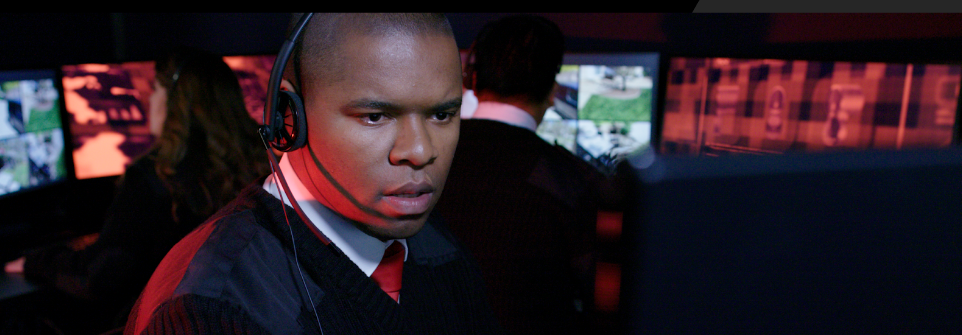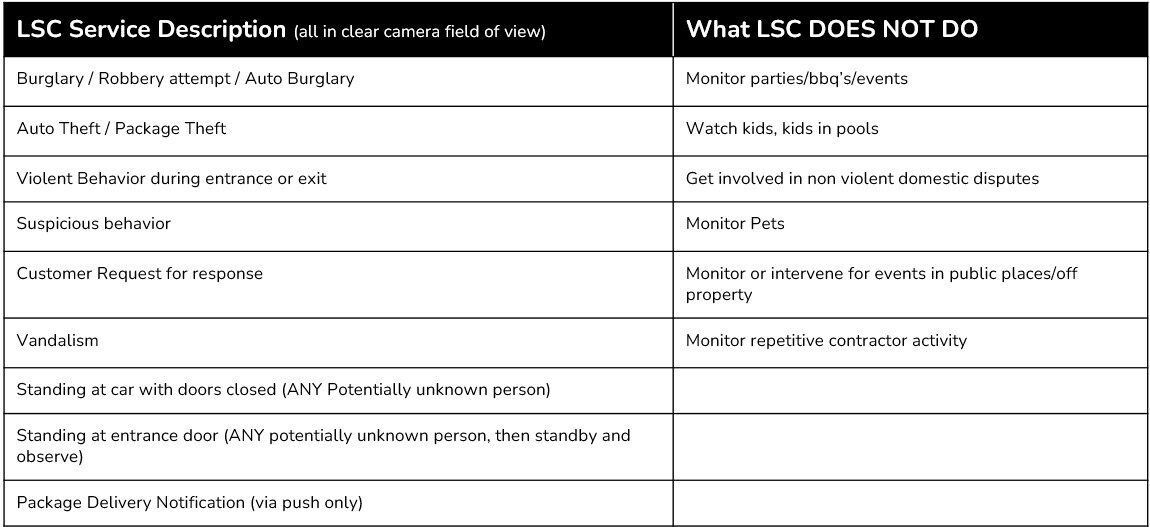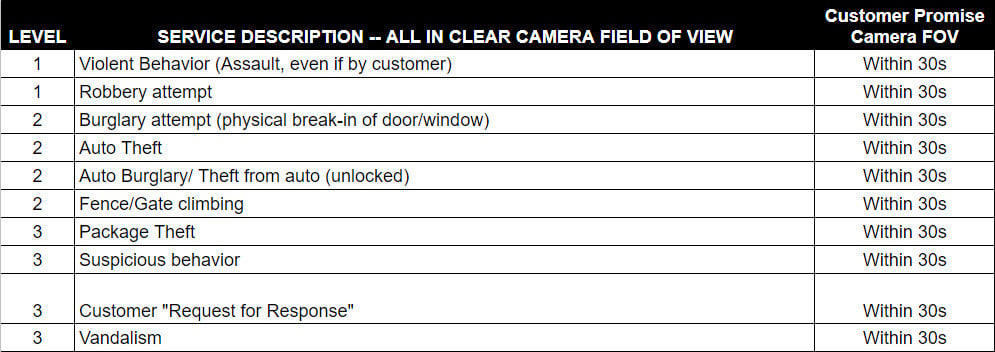
The objective of this document is to clarify the difference between the following:
- Actions included in the Live Sentinel Center (LSC) Service Level Agreement (SLA).
- Actions Expected by Customers That are "Best Effort" in the SLA
- Actions expected of guards by Deep Sentinel (DS) that are not part of the SLA.
- Multi-tenant properties
-
Things Deep Sentinel LSC does NOT do
- Violent Crimes--a special case
Here's a high-level summary:

1. Actions Included in LSC SLA
This section describes the specific incidents/situations for which an action by the DS guards is committed to clients.
The following is the list of criteria that qualify an incident/situation for coverage by the SLA:
(Actions covered by the LSC SLA are):
- Violent Behavior (Assault, domestic abuse even if by customer).
- Robbery attempt.
- Burglary attempt (physical break-in of door/window).
- Auto Theft.
- Auto Burglary/ Theft from auto (unlocked).
- Package Theft.
- Suspicious behavior
- Customer "Request for Response".
- Vandalism
Table 1 summarizes the actions covered by the LSC SLA.
Table 1: LSC SLA

2. Actions Expected by Customers That are "Best Effort" in the SLA
This section deals with actions that are often expected by customers but are NOT explicitly promised by the SLA. The items in this section can be requested by customers, but we are not contractually obligated to deliver. In other words, we may agree to make a best effort to achieve these goals, but cannot guarantee success and we will de-prioritize any of the things in this list to any potential crimes above.
Actions that may be expected by customers, but are NOT included in the SLA are:
- Always intervening, regardless of circumstances (skipping any intermediate escalation steps)
- Standing at the car with doors closed (ANY potentially unknown person).
- Standing at the entrance door (ANY potentially unknown person, then standby and observe).
- Package Delivery Notification.
Table 2 and Table 3 summarize actions that are subject to customer expectations.
Table 2: Customer expectations during business hours

Table 3: Customer expectation: Nighttime or Business off-hours

3. Actions Expected of Guards (by DS)
There are two types of situations where DS expects guards to take action. Both of these types of situations are not part of the SLA.
a. Actions Expected During MonitoringThe following is a list of situations for which DS expects the guards to take a specific action:
- A person standing at the door -- do not dismiss until the person leaves or the customer confirms.
- Repetitive Events: Pause the cameras when we see Contractors, children playing outside, BBQ/parties-Chores repetitively.
Table 4 summarizes actions expected of guards by DS during monitoring.
Table 4: Guard actions expected during monitoring.

b. Actions Expected During Police Presence
The actions expected of guards by DS during police presence are:
- Police on the property making an arrest.
- Police in distress -- physical assault.
- Police waving to camera.
- Police on Property (for example just knocking on door).
Table 5 summarizes actions expected during police presence.
Table 5: Guard actions expected during police presence

4. Multi-Tenant Properties
Multi-tenant properties have some special considerations -- for example lobbies, mailrooms (where we cannot discern package theft from someone picking up a bunch of packages), pools (which may be closed but cannot be enforced by police if tenants/owners are using it)
- Parking garages (Common areas) -- Report obvious crimes only
- Halls & stairwells (Common areas) -- Report obvious crimes only
- Mailrooms (Common areas) -- DO NOT do package theft; physical crimes only.
- Pools & “closed resources” (have business hours called CLOSED common areas) -- Trespass warnings, WILL NOT CALL POLICE other than physical crimes (e.g., assault)
- Gates/fences -- Report people hopping, and person-crimes only (NOT standard access, tailgating)
Please also be aware that in multi-tenant situations, if a camera exceeds 3,000 verified events in a month, that camera may incur additional fees.
Table 6: Multi-tenant properties

5. Things Deep Sentinel LSC does NOT do
- We do not watch pools for child and swimmer safety--Please do NOT even consider this, kids are the responsibilities of caregivers and we would hate to hear of a tragedy.
- We do not watch repetitive events such as contractors, children playing outside, BBQ/parties-Chores repetitively. (In fact we will pause cameras for events like this) LSC Guard Pause Feature
- We do not watch pets (SORRY!)
- We do not watch public areas--private property only
- We do not monitor indoor private residential properties.
The Deep Sentinel LSC will respond to violent crimes observed at any time regardless of any constraints. This includes if an LSC guard happens to be viewing a video that falls into the definition from the above.
For example, if a camera incidentally triggers and the camera's field of view includes public property where a violent crime is occurring; even though this is not a part of our SLA, we feel it is our duty to always report violent crimes.